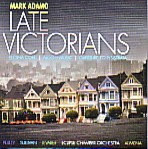There is some fine music on this disc, but like many collections of contemporary works the results overall are mixed. The best extended piece is Alcott Music, a suite arranged from Adamo’s opera Little Women (available on Ondine), atmospherically scored for strings, celesta, harp, and percussion. Although mostly gentle and delicate, the work’s thematic content is substantial enough to sustain the listener’s interest, and its timbres really are just plain lovely. The same observation applies to Regina coeli for harp and strings, the middle movement of the composer’s Harp Concerto. It whets the appetite to hear the complete work–we certainly could use another good harp concerto in the repertoire. The perky overture to Lysistrata seems a trifle thin; it cries out for a memorable tune, and when one finally arrives the piece is over–but it does leave you wanting to hear more which, after all, is one of main jobs of an overture.
This brings us to Late Victorians, which consists of sensitive settings of some Emily Dickinson poems for soprano and chamber ensemble interlaced with spoken text drawn from a Richard Rodriguez (of “News Hour” fame) essay about the AIDS epidemic in San Francisco in the 1980s. The piece doesn’t work well at all. In the first place, Rodriguez’s allusive and self-indulgent prose seems especially ungainly next to Dickinson’s laconic but razor-sharp poetic diction. Speaker Andrew Sullivan, as is so often the case when narration intrudes, is placed far too prominently in the mix; the music seems almost an afterthought. Nor, to be frank, is Rodriguez’s essay particularly compelling on its own, despite the obvious care that Adamo has taken to frame it. The end result is frustrating, like trying to hear a good piece of music on the radio while someone next to you is talking too loudly.
Finally, and this is strictly a personal observation, I am sick and tired of the politics of victimization as expressed in contemporary art music. Every group in our society has some legitimate sources of grievance or suffering, and the way that the performing arts industry seizes on them strikes me as exploitative and opportunistic. The worst recent case of this phenomenon was the flurry of atrocious 9/11 tributes, most notoriously John Adams’ grotesque, award-winning piece On the Transmigration of Souls. I am not questioning Adamo’s sincerity here, only his taste, and the culture that encourages the production of such pieces. I was just diagnosed with multiple sclerosis; my younger sister has a more severe case of the same disease and is effectively wheelchair-bound. I don’t want to hear a cantata about it. I lived in the Bay Area during the 1980s, and in 1989 my best friend died of AIDS. He was a superb classical musician and scholar. I loved him and I miss him terribly. He didn’t ask for a musical tribute, and he would not have chosen this one, however well-intentioned. So what’s next, the Swine Flu Oratorio? The Restless Leg Syndrome Requiem?
The performances by the Eclipse Chamber Orchestra under Sylvia Alimena are excellent. They know Adamo’s music and have worked with him extensively, and we may safely assume that they give him exactly what he wants. Soprano Emily Pulley sings the Dickinson poems very well, even if she tends to be overshadowed by the too-loud narration. For the purely instrumental works, I can recommend this disc without hesitation, and I won’t lower the rating as a result of my conceptual problems with Late Victorians. You will know if you’re interested in hearing it, though I can’t help but feel sad that we weren’t given the complete Harp Concerto instead.
































